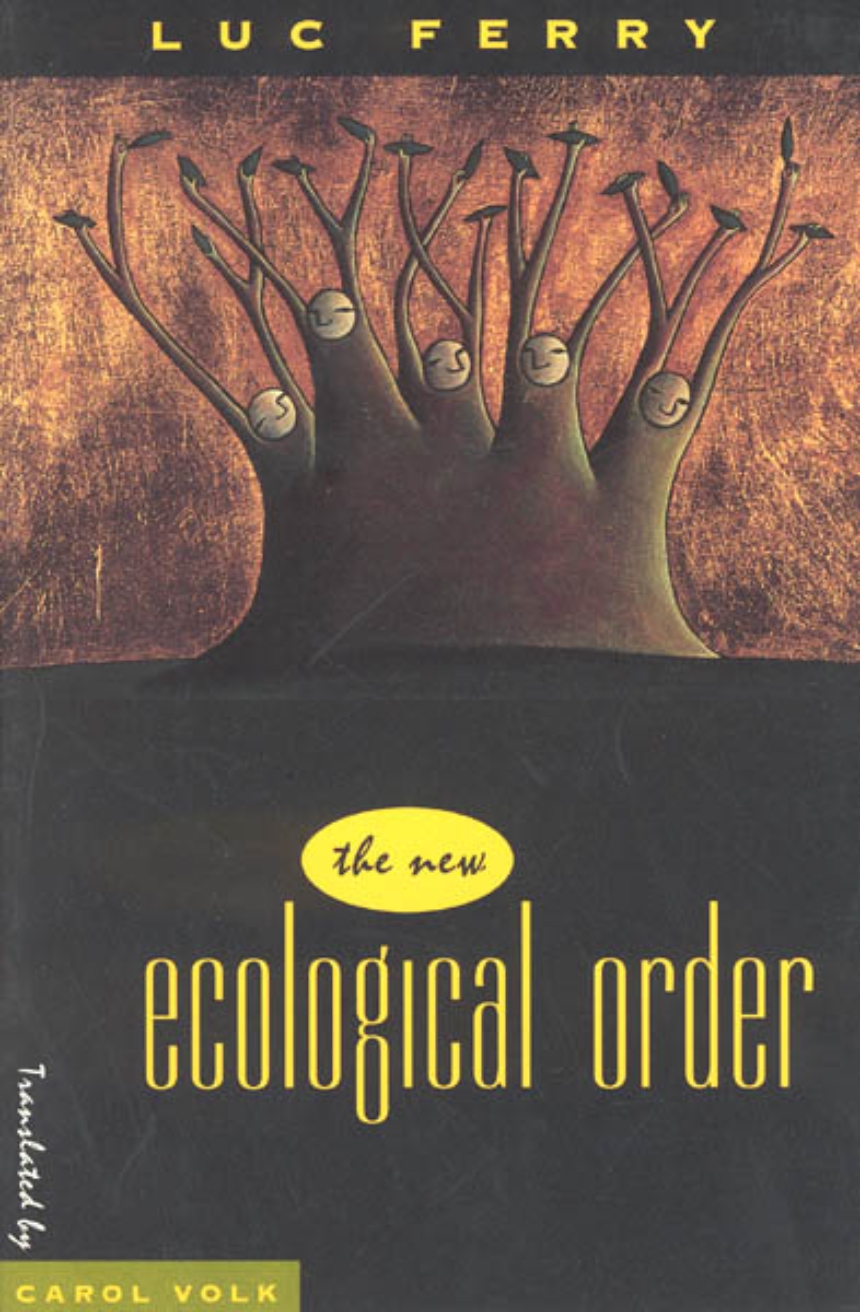The New Ecological Order
Is ecology in the process of becoming the object of our contemporary passions, in the same way that Fascism was in the 30s, or Communism under Stalin? In The New Ecological Order, Luc Ferry offers a penetrating critique of the ideological roots of the "Deep Ecology" movement spreading throughout Germany, France, and the United States.
Traditional ecological movements, or "democratic ecology," seek to protect the environment of human societies; they are pragmatic and reformist. But another movement has become the refuge both of nostalgic counterrevolutionaries and of leftist illusions. This is "deep ecology." Its followers go beyond practical critiques of human greed and waste: they call into question the very possibility of human coexistence with nature. The human species is no longer at the center of the world, but subject to a new god called Nature. For these purists, man can only soil the harmony of the universe. In order to secure natural equilibrium, the only solution is to grant rights to animals, to trees, and to rocks.
Ferry launches his critique by examining early European legal cases concerning the status and rights of animals, including a few notorious cases where animals were brought to trial, found guilty, and publicly hanged. He then demonstrates that German Romanticism embraced certain key ideas of the deep ecology movement concerning the protection of animals and the environment. Later adopted by the Nazis, many of these ideas point to a profoundly antihumanistic component of deep ecology that is compatible with totalitarianism.
Ferry shows how deep ecology casts aside all the gains of human autonomy since the Enlightenment. He deciphers the philosophical and political assumptions of a movement that threatens to infantalize human society by preying on the fear of the authority of a new theological-political order. Far from denying our "duty in relation to nature," The New Ecological Order offers a bracing caution—against the dangers of environmental claims and, more important, against the threat to democracy contained in the deep ecology doctrine when pushed to its extreme.
"A book of intellectual power, full of insights, invention, and not without temerity, from one of the best political philosophers today."—Le Figaro
"Few books have analyzed in depth this phenomenon of the ecological movement as the most recent book by Luc Ferry has done. . . . It is a book that absolutely must be read."—Le Point
Traditional ecological movements, or "democratic ecology," seek to protect the environment of human societies; they are pragmatic and reformist. But another movement has become the refuge both of nostalgic counterrevolutionaries and of leftist illusions. This is "deep ecology." Its followers go beyond practical critiques of human greed and waste: they call into question the very possibility of human coexistence with nature. The human species is no longer at the center of the world, but subject to a new god called Nature. For these purists, man can only soil the harmony of the universe. In order to secure natural equilibrium, the only solution is to grant rights to animals, to trees, and to rocks.
Ferry launches his critique by examining early European legal cases concerning the status and rights of animals, including a few notorious cases where animals were brought to trial, found guilty, and publicly hanged. He then demonstrates that German Romanticism embraced certain key ideas of the deep ecology movement concerning the protection of animals and the environment. Later adopted by the Nazis, many of these ideas point to a profoundly antihumanistic component of deep ecology that is compatible with totalitarianism.
Ferry shows how deep ecology casts aside all the gains of human autonomy since the Enlightenment. He deciphers the philosophical and political assumptions of a movement that threatens to infantalize human society by preying on the fear of the authority of a new theological-political order. Far from denying our "duty in relation to nature," The New Ecological Order offers a bracing caution—against the dangers of environmental claims and, more important, against the threat to democracy contained in the deep ecology doctrine when pushed to its extreme.
"A book of intellectual power, full of insights, invention, and not without temerity, from one of the best political philosophers today."—Le Figaro
"Few books have analyzed in depth this phenomenon of the ecological movement as the most recent book by Luc Ferry has done. . . . It is a book that absolutely must be read."—Le Point
190 pages | 5-1/2 x 8-1/2 | © 1995
Earth Sciences: Environment
Geography: Environmental Geography
Philosophy: General Philosophy
Political Science: Political and Social Theory
Table of Contents
Preface. The Passing of the Humanist Era
Pt. 1: Animals, or The Confusion of Genres
1: Antinatural Man
2: "Animal Liberation," or The Rights of Creatures
3: Neither Man nor Stone: The Enigmatic Being
Pt. 2: The Shadows of the Earth
4: "Think Like a Mountain": The Master Plan of "Deep Ecology"
5: Nazi Ecology: The November 1933, July 1934, and June 1935 Legislations
6: In Praise of Difference, or The Incarnations of Leftism: The Case of Ecofeminism
7: Democratic Ecology and the Question of the Rights of Nature
Epilogue. Nationalism and Cosmopolitanism: The Three Cultures
Index
Pt. 1: Animals, or The Confusion of Genres
1: Antinatural Man
2: "Animal Liberation," or The Rights of Creatures
3: Neither Man nor Stone: The Enigmatic Being
Pt. 2: The Shadows of the Earth
4: "Think Like a Mountain": The Master Plan of "Deep Ecology"
5: Nazi Ecology: The November 1933, July 1934, and June 1935 Legislations
6: In Praise of Difference, or The Incarnations of Leftism: The Case of Ecofeminism
7: Democratic Ecology and the Question of the Rights of Nature
Epilogue. Nationalism and Cosmopolitanism: The Three Cultures
Index
